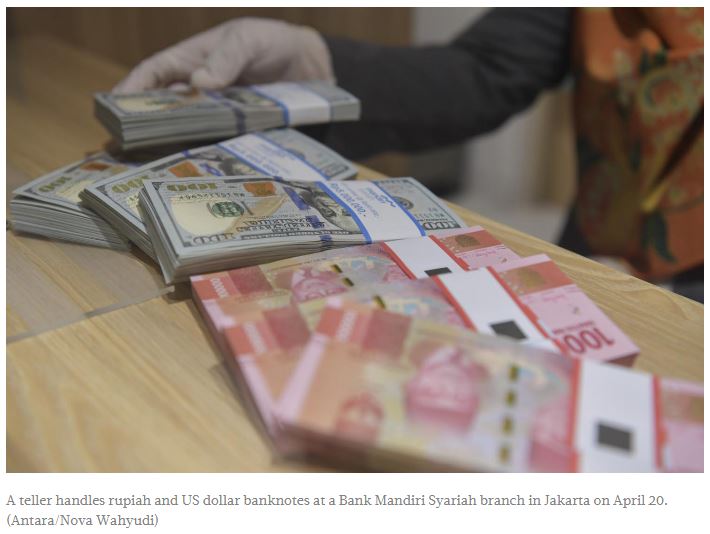Indonesia: Reallocate toward bonds, look out for equity bargains: Asset managers
Indonesian asset managers are expressing a preference for bonds amid crisis-driven market volatility, suggesting that investors gradually enter the market before the economy starts to pick up.
Bonds, especially government bonds, are considered relatively low risk and have become attractive to investors as interest rates fall.
“Sovereign debt gives quite a good return relative to time deposits, despite its downside being its difficulty to liquidate compared to time deposits,” said Michael Tjoadi, president director of Schroders Indonesia, which manages about Rp 61 trillion in funds.
The benchmark 10-year government bond yield is 7.45 percent, according to data from the Indonesia Bond Pricing Agency (IBPA). Meanwhile, the Deposit Insurance Corporation (LPS) deposit rate is now at 5.50 percent, and the Jakarta Composite Index (JCI), a benchmark measure of the Indonesian stock market, has dropped about 20 percent this year.
“2020 is the year for bonds,” said Bank Commonwealth head of wealth management and premier banking Ivan Jaya during a webinar organized by the bank on June 16.
“We are of the view that bonds are a good choice, either rupiah- or dollar-denominated bonds, as the Bloomberg consensus says that there will be more interest rates cuts.”
Bank Indonesia (BI) announced on Thursday that it had cut its benchmark interest rate, the BI seven-day reverse repo rate, by 25 basis points to 4.25 percent. It had already slashed the rate by 50 basis points this year. The central bank signaled there was room for further reduction.
“This is an opportunity to attain capital gains,” Ivan said. Historically, bond prices have moved in the opposite direction of interest rates, making them highly sought-after instruments in times of crisis.
Ivan suggested that investors reduce their proportion of equities and, in turn, increase their exposure to bonds. For balanced asset allocation, according to Ivan, 40 percent should be allocated to fixed-income assets, 35 percent to money market assets and 25 percent to equity assets.
“In fixed income, the flight to safety is to government bonds,” Eastspring Investments Indonesia chief executive officer Alan T Darmawan said in a livestreamed press conference organized by Prudential Indonesia on Tuesday.
He said that especially during the pandemic, when considering corporate bonds, investors needed to look at the company’s performance, including its cash flow, before deciding to buy the instrument.
This is not to say that investors should leave the stock market entirely, investment managers have said. As the JCI has fallen 21.88 percent this year as of Friday, they say this is a good time to collect stocks at discounted prices.
“Before the economy picks up in the year 2021, people have to invest. But because we are afraid of the possibility of a W-shaped recovery [because of a second wave of infection], invest gradually,” Michael of Schroders Indonesia said.
He added that foreign investors would most likely invest before the economy recovered, adding that entering after that time would be too late.
Throughout the year, foreign investors, who make up about 40 percent of investors on the Indonesia Stock Exchange (IDX), have sold Rp 12.6 trillion worth of stocks. Over the past month, however, the IDX recorded a net foreign buy of Rp 15 trillion.
“Are all sectors [performing] badly? Not really. There are sectors that are benefitting from the changes happening in the world,” Eastspring Investments Indonesia chief investment officer Ari Pitojo said in the press conference. Among those sectors were healthcare and communication services, Ari noted.
Prudential Indonesia chief investment officer Novi Imelda explained that defensive sectors such as technology and consumer goods were among Prudential’s preferred stocks amid the pandemic.
Throughout the year, the index for the trade, services and investment sector fell by 21.21 percent, while the consumer goods industry sector slumped by 11.50 percent. These declines were more modest than the property, real estate and building construction sector which fell by 32.94 percent over the same period.
Source: https://www.thejakartapost.com/news/2020/06/22/reallocate-toward-bonds-look-out-for-equity-bargains-asset-managers.html


 English
English




